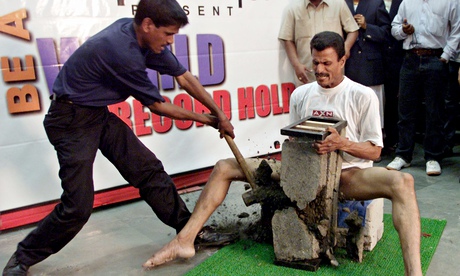
Like Kelman’s acclaimed debut novel, Pigeon English, which was shortlisted for the Man Booker prize, Man on Fire is astonishingly moving in its heartbreak and humour. It is largely the story of a middle-aged Indian, Bibhuti Bhusan Nayak, more usually known as BB who has done his best to climb out of poverty by taking on extreme sports and keeping in close touch with the almighty. He longs for fame, so that he can help his countrymen and women. He has gathered world records for his feats, including being kicked in the groin as often as possible in a set time. One can’t imagine many contestants volunteering to break this record.
He gained a Guinness endorsement – and his fellow competitors’ respect – for his record-breaking 133 one-handed push-ups. Bibhuti is magnanimous: “I am a firm believer that the goodwill of others when blended with the desire of the almighty makes the most potent mix. When a person drinks from this source he truly becomes unbreakable. I am the living proof of this.” Bibhuti believes he can cure himself in days of his many injuries, such as those caused by having scores of bicycles run over his stomach. His worldview is both beguiling and bonkers.
Not surprisingly, Bibhuti’s wife “has no understanding of such things. Unfortunately she is unable to enjoy my achievements fully, due to narrowness of mind and persistent worries for my safety.” There is something universal in Bibhuti’s innocent striving, which clutches at the heart. (About 50 pages into this enchanting book, I discovered that it is a true story and Bibhuti is a real man. He achieved minor fame in England when the television comic, Paul Merton, while making a documentary on Indian byways, was persuaded to kick the brave man in the balls, as the script has it. This ritual was almost his calling card.)
Now Bibhuti is on the trail of new endeavours. One of these is for someone to break as many baseball bats as possible on his body in a specified time. The Guinness Book of Records, Indian branch, is not keen to endorse this attempt; it is too dangerous. His wife is distraught, believing he could be seriously injured. Now the story becomes darker. An Englishman called John Lock – soon to die of cancer – comes to India to drink of Bibhuti’s wisdom. He has left his wife behind, after pretending he has committed suicide. He and Bibhuti bond, and Lock becomes one of the family. Lock has, Bibhuti says, given him a chance of real fame. He can also cure Lock’s cancer. The whole enterprise is rickety, absurd and shot through with delusion, but deeply human.
When Lock’s wife comes to India to find him, having discovered the truth from his bank records, both men are faced by the united front of two sceptical women. Disturbingly, there are hints that Lock is looking forward to beating Bibhuti senseless. In the event, he does beat Bibhuti, with Bibhuti’s encouragement, but breaks only 11 bats before the crowd turns on him, and the police take him into custody for his own safety (but also to negotiate a bribe).
Man on Fire does what a novel at its best can do; underneath the humour and pathos and Bibhuti’s hopes and dreams, we find an account of India itself. Out of this unlikely material, Stephen Kelman has written a book of profound beauty and deep empathy.
Man on Fire is published by Bloomsbury Circus (£12.99). Click here to order it for £10.39

